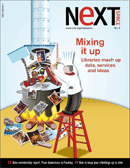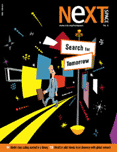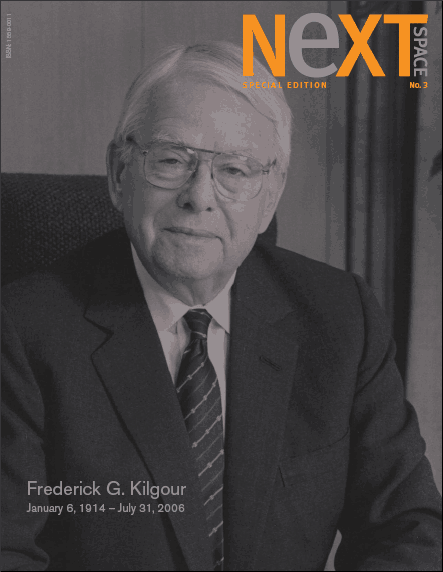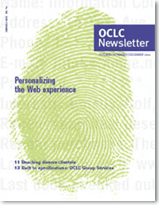|
NextSpace is OCLC’s magazine for our members and information managers. NextSpace analyzes industry trends and technology developments as well as feature news about OCLC. Our goal is to help you stay informed and make key decisions.
 |
|
In Life 2.0, people move into a shared network space that drives work, research, education, entertainment, social activities—essentially everything they do. They use digital tools—PDA, MP3, laptop, cell phone, camera, PC—to tell their stories and interact with the world. They are always online, connected to one another and to the Web.
|
Features
Architecture as advocacy
The new Amsterdam Public Library is an architectural gem that features skylights, terraces, a seven-story atrium, walls of windows, stunning views and an open floor plan that constantly presents new spaces and interesting places. The facility is the foundation of the city’s redevelopment for the Oosterdokseiland area—and the heart of the library’s new attitude.
New life for special collections
CONTENTdm 5 will fully support Unicode, an industry standard that allows computers to represent and manipulate text expressed in most of the world’s writing systems. This ability will greatly expand CONTENTdm’s global reach and enable digital collections with Arabic, Chinese, Cyrillic, Greek, Hebrew, Japanese and Korean scripts to be fully searchable.
|
Past issues

One of the fastest growing trends today is combining data and functionality from several sources to create new services that provide a unique user experience. They're called mash ups. Think Google Maps. Yahoo Pipes. Facebook Plug-Ins. Libraries are doing Web mash ups as well: Meebo Instant Messaging. Library Lookup. Bookburro. And, in a way, libraries have been doing all kinds of mash ups for years. Think story hour, open-shelf access, cafes. |

Leslie Crutchfield and Heather McLeod Grant discovered six breakthrough practices that largely determine the impact a nonprofit organization can deliver. Can libraries apply these practices both individually and collectively to make a difference in the digital age? |

NextSpace asked nine experts for their thoughts about our increasingly online lives. The challenge is how to apply social networking in a digital age to enhance and extend the public service mission of libraries, museums and archives. |

The battle for search supremacy is hardly over. In fact, search is in its early days and poised at the cusp of several major leaps forward. What impact will they have on libraries? And how can libraries benefit? |

As libraries battle popular search engines and Internet research services for users, the new book The Ultimate Question by Fred Reichheld says that one simple question determines an organization’s future: Would you recommend us to a friend? Learn more about this one-question survey and the latest efforts in library customer service and assessment. |

The architecture of the Web is transforming the way systems are built and services delivered. Application development can now mean mixing data and functionality from several Web sites with your service to provide a unique and powerful user experience. What library services will move to the new network platform? |

Frederick G. Kilgour, a librarian and educator who created an international computer library network and database that changed the way people use libraries, died on July 31, 2006. He was 92 years old and had lived since 1990 in Chapel Hill, North Carolina. |

Remember when it was cool to surf the Web? Logon, type a few words, view a few pages, logoff. Hold on to your search box, because the Web is on the cusp of another wave of jarring change. |

Three legacy brands—McDonald’s, Discovery Channel and IBM—have all successfully repositioned their brands in recent years to maintain their ability to influence consumer behavior. Why should libraries care about rebranding themselves—and what can they learn from these examples? |

A revolutionary new economic theory says that the digital future is one of abundance—when the bottlenecks that stand between supply and demand disappear and everything becomes available to everyone. How will libraries fit in?
|

As Gamers and Boomers collide in one of the biggest culture clashes in history, society is being reshaped. What will the impact be on libraries? And how can libraries attract Gamers and serve both generations? |

In the quest to serve the information consumer, libraries face competition with the sophisticated profiling and customization technologies of search engines, e-tailers and Internet service providers. How can they make the search experience at the digital library as exciting and as personal as the experience at Web bookstores and search engines? |
View additional past issues of the OCLC Newsletter.
|
Subscribe
As its name implies, NextSpace is about the next idea or the next trend affecting libraries. It is also about the next step that will help libraries create value and shape their future.
NextSpace replaces the OCLC Newsletter. If you subscribed to the OCLC Newsletter, you will automatically receive NextSpace.
If not, you can subscribe online or send requests or comments to nextspace@oclc.org.
|
 Librarians' Toolbox:
Librarians' Toolbox: